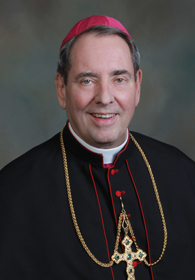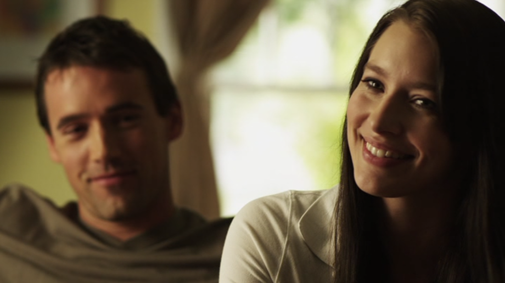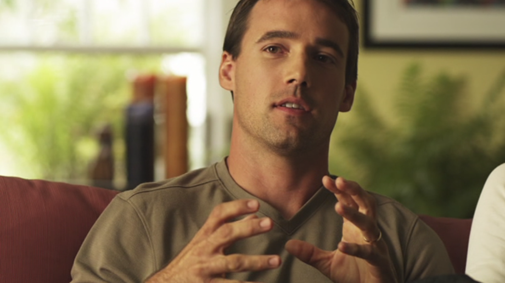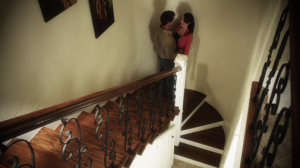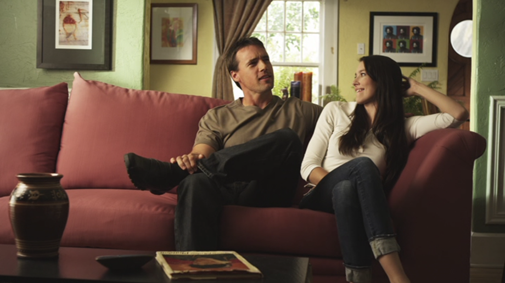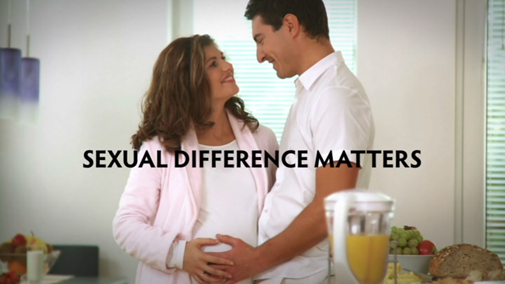Sunday Pope Quote: Benedict XVI on the connection between "life issues" and marriage
Just last Saturday, September 22nd, Pope Benedict XVI offered beautiful words about marriage and the family to participants in the meeting of the Christian/Centrist Democrat International. In his remarks, the Holy Father connected life and marriage – a perfect statement to share on the eve of October, which is Respect Life month!
Pope Benedict XVI: The commitment to respecting life in all its phases from conception to natural death – and the consequent rejection of procured abortion, euthanasia and any form of eugenics – is, in fact, interwoven with respecting marriage as an indissoluble union between a man and a woman and, in its turn, as the foundation for the community of family life. It is in the family, “founded on marriage and open to life” (Address to the Authorities, Milan, 2 June 2012), that human beings experience sharing, respect and gratuitous love, at the same time receiving – be they children, the sick or the elderly – the solidarity they need. The family, moreover, constitutes the principal and most significant place for the education of the person, thanks to the parents who place themselves at the service of their children in order to draw out (“e-ducere“) the best that is in them. Thus the family, the basic cell of society, is the root which nourishes not only the individual human being, but the very foundations of social coexistence. Blessed John Paul II was right, then, to include among human rights, “the right to live in a united family and in a moral environment conducive to the growth of the child’s personality” (Enc. Centesimus annus, 47).
The authentic progress of human society cannot forgo policies aimed at protecting and promoting marriage, and the community that derives therefrom. Adopting such policies is the duty not only of States but of the International Community as a whole, in order to reverse the tendency towards the growing isolation of the person, which is a source of suffering and atrophy for both individuals and for society.
– Address to Participants in the Meeting of the Christian/Centrist Democrat International (Sept. 22, 2012)
Archive
"When Two Become One": New Pastoral Letter on Marriage from Newark's Archbishop Myers
On September 14, the feast of the Exaltation of the Holy Cross, Archbishop John J. Myers of Newark released a new pastoral letter about marriage: “When Two Become One: A Pastoral Teaching on the Definition, Purpose and Sanctity of Marriage.”
The Archdiocese of Newark blog explained that the pastoral reflection “was written to help the faithful of the Archdiocese form their consciences, discern their vocations and, for the married, fulfill their vows.” It also noted that clergy in the Archdiocese of Newark would read a letter from Archbishop Myers about the pastoral at all masses this weekend, September 29-30, and that copies of the one-page Executive Summary would be sent to all parishes. In addition, all Catholic high schools in Newark will receive a copy of the pastoral letter and be asked to incorporate it into the Family Life curriculum.
Throughout his 16-page letter, Archbishop Myers quotes from Scripture, papal encyclicals, modern theologians, and even social science research to explain and reinforce the Church’s timeless teaching on marriage. The letter is set up as responses to a series of familiar questions:
What is marriage?
“Marriage is a natural and pre-political institution. . . . We cannot define and redefine marriage to suit our personal tastes or goals. We cannot make forms of relationships or types of conduct marital simply by attaching to them the word ‘marriage.’ The defining features and structuring norms of marriage are written in the design of creation and revealed to us by a loving God who has made marriage a powerful symbol of the mystery of his love for us.”
Can the truth about marriage be known through reason alone?
“The short answer to this question is ‘yes’ . . . Philosophers, both secular and religious, have from antiquity recognized the existence of the ‘natural law’: a body of moral norms ‘written on the heart,’ as St. Paul said, that serve as the universal rational standard for human behavior.”
What does the Catholic Church teach about persons with homosexual attraction?
“Some mistakenly charge that Christ and His Church condemn or fail to love persons who experience romantic or sexual attraction to members of the same sex. On the contrary, while calling us to renounce all sinful behavior, Christ and His Church unequivocally love every last human person, in every condition of life: the unborn and the dying; the able-bodied and the sick; the young and the old; and men and women, whatever their inclinations.”
Don’t equality and justice require the state to recognize same-sex unions as marriages?
“Because same-sex couples cannot enter into the one-flesh unity of marriage – they cannot participate in reproductive type acts – they cannot marry in any meaningful sense of the term. Marriage is not mere sexual-romantic domestic partnership. It is, at its very foundation, a one-flesh union. And it is because an essential element in authentic marriage is the capacity to participate in reproductive-type acts that can, and often do, lead to children that the state has a vital interest in recognizing and promoting marriages.”
Should civil law reflect the natural law?
“Civil law should reflect the natural law to the extent that public order allows. . . . Any attempt to change the definition of marriage at the political level represents an overreaching of the competence of politicians and, indeed, of civil positive law.”
Should faithful Catholics defend the traditional teaching on marriage in the public square?
“I write as the Archbishop of Newark with the responsibility to teach the truth about the faith, including the truth about marriage, ‘in season and out,’ as St. Paul admonished Timothy. . . But I also write as a citizen of the United States with responsibilities to help promote the true common good for all. . . . Along with our commitments to defend life and serve the poor, the protection and promotion of the family serves as the core principle of our social commitment.”
Read:
- “When Two Become One: A Pastoral Teaching on the Definition, Purpose and Sanctity of Marriage”
- One-page Executive Summary
- Earlier pastoral statements from Archbishop Myers
- “A Meditation on Pope Paul VI’s Humanae vitae” (August 13, 2003)
- “And the Word became Flesh: A Theological Reflection on the Human Body” (December 8, 2002)
Listen:
- Interview: Archbishop Myers talks to Vatican Radio
Archive
New Videos: Washington State Bishops Defend Marriage
In four new videos, Archbishop J. Peter Sartain of Seattle and Bishop Blase J. Cupich of Spokane urge Catholics in Washington state to uphold marriage as the union of one man and one woman.
Background: In the upcoming November election, Referendum 74 will give voters in Washington state the chance to reject or approve a law passed in February 2012 that redefined marriage to include two persons of the same sex.
For more information: See the website of the Washington State Catholic Conference.
Archive
Sunday Pope Quote: Bl. John Paul II on creation and womanhood
Today’s Sunday Pope Quote comes from a lesser-known writing of Bl. Pope John Paul II, Letter to Women, which was published in 1995.
Bl. Pope John Paul II: Dear sisters, together let us reflect anew on the magnificent passage in Scripture which describes the creation of the human race and which has so much to say about your dignity and mission in the world.
The Book of Genesis speaks of creation in summary fashion, in language which is poetic and symbolic, yet profoundly true: “God created man in his own image, in the image of God he created him; male and female he created them” (Gen 1:27). The creative act of God takes place according to a precise plan. First of all, we are told that the human being is created “in the image and likeness of God” (cf. Gen 1:26). This expression immediately makes clear what is distinct about the human being with regard to the rest of creation.
We are then told that, from the very beginning, man has been created “male and female” (Gen 1:27). Scripture itself provides the interpretation of this fact: even though man is surrounded by the innumerable creatures of the created world, he realizes that he is alone (cf. Gen 2:20). God intervenes in order to help him escape from this situation of solitude: “It is not good that the man should be alone; I will make him a helper fit for him” (Gen 2:18). The creation of woman is thus marked from the outset by the principle of help: a help which is not one-sided but mutual. Woman complements man, just as man complements woman: men and women are complementary. Womanhood expresses the “human” as much as manhood does, but in a different and complementary way.
When the Book of Genesis speaks of “help”, it is not referring merely to acting, but also to being. Womanhood and manhood are complementary not only from the physical and psychological points of view, but also from the ontological. It is only through the duality of the “masculine” and the “feminine” that the “human” finds full realization.
– Letter to Women, no. 7
Archive
"Every time we make love…we're making life…giving life…It's not just sex…I come alive, and there's a sense of forever in that."
Note: Over the next few weeks, we’ll be reading through the Viewer’s Guide for the video “Made for Each Other.” In the video, married couple Josh and Carrie reflect on the meaning of sexual difference. Each section of the Viewer’s Guide takes a quote from either Josh or Carrie and fleshes it out. The goal of the Viewer’s Guide is to help you, the reader, become more confident in promoting and defending the meaning of marriage as the union of one man and one woman.
This is part 7 of the series, and we’ll reflect on what it means that married love is unitive and procreative, and also look at the deeper meaning of sex and the good of friendship.
“Every time we make love…we’re making life…giving life…It’s not just sex…I come alive, and there’s a sense of forever in that.”
While not every husband may put into words what Josh expressed, Josh is speaking about more than just personal experience. He’s getting at the deeper meaning of sex, of conjugal love, the love between husband and wife. The unique bond of spousal love is itself life-giving. This is what the Church means by the inseparability of the unitive and procreative aspects of the conjugal act. [i]
The Church’s teaching on marriage and sexual difference is deeply connected with her teaching on sex itself. According to the Catechism of the Catholic Church (no. 2360), “Sexuality is ordered to the conjugal love of man and woman. In marriage the physical intimacy of the spouses becomes a sign and a pledge of spiritual communion.” Human sexuality in the context of marriage is an organic, holistic reality. Sex is both procreative and unitive, meaning that sex can lead to new life and unite the spouses. [ii]
How about we go deeper: Within the context of marriage, these three elements, sexual difference, spousal love, and natural procreation (fruitfulness), work together. [iii] A husband and wife’s love for each other directs their sexual energies exclusively toward their spouse. Spouses’ sexual activity brings them closer together, and may result in a child whom they both love. The child is equally the child of both husband and wife, now father and mother. And when these elements are together and respected, the child is welcomed as a gift. Also, as expressed by Josh and Carrie in their openness to life, married love is still called to be fruitful even without the blessing of a child. [iv]
The modern alternative to the Church’s teaching is that sex is a private recreational activity, that it may be deliberately made sterile and has no moral or social significance. In this view, it is “perfectly proper” to disconnect sex from marriage, from procreation and even from love. Sexual difference becomes reduced to a superficial and arbitrary social construct. The modern world teaches that we can have sex without babies, have babies without sex, and have either without any connection with one’s husband or wife. The modern world considers these legitimate expressions of our independence and freedom.
This downgrading of the sexual act to immediate pleasure, rather than the true and complete union of two persons, man and woman, has gone hand in hand with the increasing isolation between men and women. Sex in the context of marriage creates deep and meaningful connection between the sexes. But in modern society, sex is often focused on the self and on personal pleasure, rather than on mutual self-giving. In this context where sex is detached from marriage, sex ceases to be a union of anything, but rather simply and exclusively an occasion for mutual stimulation. Sexual acts performed with these attitudes do not create a union of persons but deter such a union. Instead of being a couple who give to each other, objectively the people are a pair of individuals who take from each other.
In this context as well, authentic and holy friendship, a good for all people, has suffered and has been devalued. The heroic recovery of the inseparable connection between chastity and true, virtuous friendship is needed today.
Previous sections:
- “We were made for each other, as a man and a woman.”
- “That connection…to be authentic, it has to be the whole person.”
- “Making love and having children…that depends on our difference.”
- “That’s why it’s unique to a man and a woman.”
- “It’s not just about biology…”
- “We share a common humanity, but our sexual differences are essential to who we are.”
Archive
"We share a common humanity, but our sexual differences are essential to who we are."
Note: Over the next few weeks, we’ll be reading through the Viewer’s Guide for the video “Made for Each Other.” In the video, married couple Josh and Carrie reflect on the meaning of sexual difference. Each section of the Viewer’s Guide takes a quote from either Josh or Carrie and fleshes it out. The goal of the Viewer’s Guide is to help you, the reader, become more confident in promoting and defending the meaning of marriage as the union of one man and one woman.
Section 6 is about the equality of man and woman and how sexual difference is relevant not only to marriage but to all human action and relationships.
“We share a common humanity, but our sexual differences are essential to who we are.”
Carrie’s line says something significant about men and women. Every woman and man share the same humanity and the same dignity as human persons made in the image of God. Each is a complete human person. They’re equal in their humanity and dignity, but they’re not simply the same. Their sexual difference, as a man or a woman, remains important at every level. This is why talk about sexual difference not only concerns marriage. Our sexual identity as a man or a woman is meant to be acknowledged and accepted. [i] It has significance for all the various ways we relate to others, whether we’re married or not, whether we’re a mother or father or not.
For example, the significance of male and female differentiation goes beyond reproduction or procreation. Various branches of science, such as those mentioned above, can show that men and women differ in a whole variety of dimensions. We may have conversations differently; take risks differently; form and process relationships differently; respond to threats differently. These differences do not imply that one sex is superior to the other. Men and women are different, validly different. Admitting this does not diminish either sex but serves to enhance their unity.
Of course, men and women differ among themselves, as well as differing from each other. Sex differences in each and every trait need not be present in each and every individual woman or man. But the structural differences between male and female bodies allow a husband and a wife to join together in the one-flesh union and bring forth new life together.
Our maleness or femaleness is essential to our identity as persons. Our gender is not something that is pasted onto us as an after-thought, or that is an incidental part of who we are. Male and female are two different ways of being human, body and soul. When we deny our identity as sexually differentiated beings, we diminish our humanity.
Previous sections:
Archive
Sunday Pope Quote: Benedict XVI on marriage and society
You just never know when the Holy Father will talk about marriage! Today’s Sunday Pope Quote comes from a relatively obscure source: an address of Pope Benedict XVI to the new ambassador of Hungary to the Holy See. In it, he talks about marriage’s place in Europe, but we could easily substitute “America” for “Europe.”
Pope Benedict XVI: Marriage and the family constitute a decisive foundation for the healthy development of civil society, countries and peoples. Marriage as a basic form of ordering the relationship between a man and a woman and, at the same time, as a founding cell of the State community has continued to be modelled on biblical faith. In this way, marriage has given Europe its particular aspect and its humanism, also and precisely because it has meant continuously learning and achieving the characteristic of fidelity and self-denial that this implies. Europe would no longer be Europe if this basic cell of the social fabric were to disappear or to be substantially transformed.
We all know how endangered marriage and the family are today — on the one hand because of the erosion of their most intimate values of stability and indissolubility, due to the increasing liberalization of divorce laws and the ever more widespread custom of men and women of cohabiting without legal sanction and the protection of marriage, and, on the other, because of the different forms of union that have no basis in the history of culture and law in Europe. The Church cannot approve legislative initiatives that imply the support of alternative models of life for couples and the family. They contribute to the weakening of the principles of natural law and thus to the relativization of all legislation, as well as of the awareness of values in society.
– Address to the New Ambassador of Hungary to the Holy See (Dec. 2, 2010)
Archive
"It's not just about biology…"
Note: Over the next few weeks, we’ll be reading through the Viewer’s Guide for the video “Made for Each Other.” In the video, married couple Josh and Carrie reflect on the meaning of sexual difference. Each section of the Viewer’s Guide takes a quote from either Josh or Carrie and fleshes it out. The goal of the Viewer’s Guide is to help you, the reader, become more confident in promoting and defending the meaning of marriage as the union of one man and one woman.
In part 5, we’ll see why sexual difference is more than anatomy, and we we’ll talk about the spousal meaning of the body and the role of science.
“It’s not just about biology…”
Returning to sexual difference, Josh makes an important point. The difference between a man and a woman is not just an insignificant biological fact. [i] “We’re wired differently,” as Josh says. Biology is important, but the body and the person are not reducible to biology. Sexual difference involves the whole person, body and soul.
Furthermore, as Pope John Paul II taught, the body has a “spousal meaning.” [ii] The body, in its masculinity or femininity, reveals that we are persons who are made to be a gift to others and to be received as a gift by others. This spousal meaning of the body speaks an essential truth relevant to all people, not only those called to marriage. It also indicates what was said above, that the body is more than just a biological reality. The body reveals the person. We’re not souls trapped in bodies. We’re “body-persons.” We don’t just have a body. We are our bodies in a real sense. Our bodies are fundamental to who we are. The body of a man and the body of a woman are distinct, personal realities.
A husband and a wife have unique and personal gifts that they offer to each other. Not only do they give each other their physical bodies, but they give their distinct persons to each other, as man and woman, in and through their bodies, in and through their sexual difference. Their bodies speak a unique language of love, reserved specifically for marriage. Neither biology nor culture alone can explain this. It has to do with the nature of the human person as a unity of body and soul, created as man and woman. [iii]
That being said, it is a curious phenomenon of our time that, while the natural sciences have advanced in so many areas, including in the study of the human person, an appreciation and application of these sciences in relation to sexual difference and human sexuality in general is often lacking in our contemporary society. Why is this? It’s a worthy question to consider. For example, when it comes to food and diet these days, we do not hear things like “eat whatever and however much you want because there won’t be any consequences (or we’ll handle the consequences as they come).” Medically and scientifically speaking, no one buys that.
But what about the body and sex? Our culture’s prevailing philosophy seems to deny that there are powerful consequences to sex. Even when faced with the facts of such consequences, the dominant philosophy continues to say “do whatever you want with your body and we’ll deal with the consequences as they come—in fact, we’ll do whatever it takes to let you do anything to your body…” Sounds like a disconnect here and a lack of medical and scientific rigor. And what about sexual difference? While some play down the reality of sexual difference or limit it to the difference between female and male anatomy, sciences such as neurobiology, gynecology, evolutionary psychology, endocrinology, histology, and reproductive physiology—to name a few—point to the intricate, unique and complementary physiologies of women and men. Sexual difference is more than a surface difference in human anatomy, and attempts to explain sexual difference as a socially constructed reality are lacking in rigor. The body/person dualism of today (i.e., which holds that the body is separable from the person and that we can therefore do whatever we want to with our bodies) is neither realistic nor scientific. All of this is to say that while sexual difference is more than a biological fact, biology and the related sciences can be of great help in appreciating the unique gifts of men and women.
Previous sections:
Archive
Statement from Bishops of Washington State: "Marriage and the Good of Society"
The Washington State Catholic Conference, which represents the Catholic bishops of Washington State, recently released the following pastoral statement about marriage:
Marriage and the Good of Society
A Pastoral statement regarding Referendum 74
On November 6 the people of Washington State will vote on Referendum 74, a ballot measure with far-reaching significance. Voters will be asked to “approve” or “reject” a new law that legalizes marriage between couples of the same sex. This public policy debate is due in part to historic patterns of injustice toward persons with same-sex attraction. Thus, for many, the desire to redefine marriage has its origins in compassion for friends and family members who have experienced bias, unjust discrimination and personal rejection for their sexual orientation. As pastors and the bishops of Washington State, we are sensitive to this suffering and reaffirm our commitment to protect and defend the dignity of every human person. We also affirm the Church’s consistent teaching that marriage can only be the union of one man and one woman.
The Purpose of Marriage
In light of its divine origins and the teaching of Jesus, the Church has always understood that marriage — in addition to its sacramental nature — is a social contract. Marriage is the foundational unit of human society, because it exists for the good of husband and wife and the strengthening of their unique, permanent, and faithful bond of love. In addition, because human sexuality orders the transmission of human life through man and woman, children “are part of the glory of marriage,” as St. Augustine wrote many centuries ago. Marriage is founded on sexual difference and ordered toward the fulfillment of husband and wife and the procreation and rearing of children. This basic understanding of marriage and family is “built in” to the very nature of man and woman. No matter how well-intentioned, the effort to redefine marriage in civil law to include people of the same sex will not serve the good of society because it would detach marriage from its essential character and purpose. Furthermore, the redefinition of marriage does not bestow any new legal rights on couples of the same-sex in Washington State. In 2009 a law was passed that granted to registered domestic partners every legal benefit enjoyed by couples in traditional marriages.
Marriage and Children
Civil marriage law exists to promote the best environment for the health, welfare and education of children. Approval of Referendum 74 would subordinate the union of children with their mother and father to a legal entitlement for adults. By separating marriage from procreation and the responsibility of men and women to raise children that result from their sexual union, the new marriage law would abandon the state’s principal interest in this time-honored institution. If the state successfully disconnects marriage from the potential inherent to sexual union between a man and woman, the civil meaning of marriage will be lost, and the institution that results will be a genderless contract without reference to children. The foundational nature of marriage for the good and the strength of human society will be harmed beyond repair. Faithful, monogamous marriages between one man and one woman will cease to be the legally-established social standard for uniting children with their parents, even though social science has established that children do best when raised in homes with married mothers and fathers.
Marriage Law and Religious Liberty
In addition, the legal separation of marriage from procreation would have a chilling effect on religious liberty and the right of conscience. Once marriage is redefined as a genderless contract, it will become legally discriminatory for public and private institutions such as schools to promote the unique value of children being raised by their biological mothers and fathers. No institution or individual could propose that married mothers and fathers provide a singular benefit to children without being accused of discrimination. Recent attacks on churches, businesses and nonprofit organizations that express their conscientious objection to the redefinition of marriage underscore the danger. Those who uphold families based on the permanent, faithful relationship between a married man and woman as the best environment for raising children already have been accused of hate speech, and the right of religious institutions to freely practice their faith has been abridged.
Conclusion
As teachers and Church leaders, we reaffirm the need to recognize and defend the rights of all people. However, redefining marriage as a means of dealing with important issues of equality and respect for persons with same-sex attraction will not achieve this goal and would overturn centuries of common law. We are deeply concerned about equality, justice and the good of society and the family. Our support for traditional marriage is not born of bias or intolerance toward anyone. Instead, our purpose is to support the legal definition of marriage as the union of one man and one woman in order to promote the common good. We therefore urge Catholic people to uphold our consistent teaching on marriage for the good of the Church, society, spouses and their children. Finally, we reject the redefinition of marriage as a “civil contract between two persons.”
We are hopeful the vote on Referendum 74 will be an opportunity to debate this important social issue in an atmosphere of respect, honesty and conviction. As Americans, we have the freedom to debate public policy matters freely and publicly, and we pray that our dialogue will be marked by civility and clarity. We submit these reflections in hopes that they will contribute to such a dialogue and assist Catholic people in forming their consciences on Referendum 74.
PDF of “Marriage and the Good of Society” (Sept. 4, 2012)
Website of Washington State Catholic Conference
Archive
Sunday Pope Quote: Bl. John Paul II on the fruitfulness of married love
Today’s Sunday Pope Quote comes from Bl. John Paul II’s apostolic exhortation Familiaris Consortio (The family in the modern world). Here he is discussing what it means for married love to be fruitful…and it might surprise you how truly wide and deep this concept is!
Bl. John Paul II: “Fruitful married love expresses itself in serving life in many ways. Of these ways, begetting and educating children are the most immediate, specific and irreplaceable. In fact, every act of true love toward a human being bears witness to and perfects the spiritual fecundity of the family, since it is an act of obedience to the deep inner dynamism of love as self-giving to others.
“For everyone this perspective is full of value and commitment, and it can be an inspiration in particular for couples who experience physical sterility.
“Christian families, recognizing with faith all human beings as children of the same heavenly Father, will respond generously to the children of other families, giving them support and love not as outsides but as members of the one family of God’s children.
. . .
“Family fecundity must have an unceasing ‘creativity,’ a marvelous fruit of the Spirit of God, who opens the eyes of the heart to discover the new needs and sufferings of our society and gives courage for accepting them and responding to them.”
– Familiaris Consortio, no. 41
Archive
"That's why it's unique to a man and a woman."
Note: Over the next few weeks, we’ll be reading through the Viewer’s Guide for the video “Made for Each Other.” In the video, married couple Josh and Carrie reflect on the meaning of sexual difference. Each section of the Viewer’s Guide takes a quote from either Josh or Carrie and fleshes it out. The goal of the Viewer’s Guide is to help you, the reader, become more confident in promoting and defending the meaning of marriage as the union of one man and one woman.
Part 4 talks about the essential difference between marriage and same-sex “unions” and gives some helpful analogies.
“That’s why it’s unique to a man and a woman.”
Josh here states a simple yet central fact of human life and history. Marriage is unique to a man and a woman. This is not arbitrary or fabricated. There’s a reason for it: “That’s why…” In fact, there are many reasons. But they rest first on sexual difference. The difference is the difference. Without sexual difference, one can’t speak of marriage or anything analogous to marriage.
This clearly relates to the question of same-sex “marriage” and the various types of same-sex “unions.” The Church recognizes that this can be an emotional and difficult issue. It’s important always to consider the human person. Every human person is made in the image and likeness of God, with a dignity that can never be erased. [i] Every person deserves love and respect, as well as truth. “As I have loved you, so you also should love one another” (Jn 13:34). When the Church teaches difficult truths, she witnesses to Christ who “loved to the end” (cf. Jn 13:1).
The Church intends no disrespect for our brothers and sisters who experience same-sex attraction. The Church reminds us that we are all called to the Lord’s grace and mercy. Christ died for each and every one of us. The Church reaches out to persons who experience same-sex attraction. [ii] She calls all people to a life of holy fulfillment, that is, to a deeper and fuller union with Jesus Christ. As support along the way in a life of chastity and virtue, the Church speaks to the importance and great good of healthy and holy friendships, family and community support, prayer and sacramental grace. Any lack of respect, compassion, or sensitivity towards persons with a homosexual inclination is unacceptable. The protection and promotion of marriage as the union of one man and one woman is and must always be found within this context of love and respect for all persons.
Fundamentally, what’s missing in the assumption that persons of the same sex can marry is sexual difference. Two persons of the same sex are too similar to form a complementary union of persons. Bodily, two men or two women are “the same,” not different or distinct. Healthy and holy friendship is possible, but not conjugal union. A conjugal or marital union comes about only through sexual difference. Sexual acts between persons of the same sex are neither unitive nor procreative in kind. [iii] Such acts can never form a true union of bodies and persons and are contrary not only to the Church’s teachings but to the truth of their very persons as witnessed by the language of the body. [iv] On the other hand, spouses give themselves to each other in a sexually and personally distinctive way. Only a husband and a wife have the space or capacity to receive truly each other’s distinctive sexual gift, and only a husband and a wife can make a gift of their selves to the other in that way.
Take Josh’s analogy. Marriage is like water. The distinct elements of oxygen and hydrogen combine to make water, something totally new and unique. Without the different elements, water cannot exist. Likewise, without the difference of man and woman, marriage cannot exist.
Carrie’s analogy also helps. A woman and a man are like a violinist and cellist, respectively, who play the same piece of music (i.e., their humanity) in different but harmonious ways (i.e., as woman and as man). A man and a woman complement each other in a totally unique way. Without this complementarity grounded in sexual difference, marriage simply cannot be.
There’s nothing mean-spirited in recognizing and protecting the unique truth of marriage. It’s the truth of love and the truth of the person, and living in accord with the truth will always be what’s best for us. Even when difficult, the truth sets us free.
Previous sections:
Archive
"Making love and having children…that depends on our difference."
Note: Over the next few weeks, we’ll be reading through the Viewer’s Guide for the video “Made for Each Other.” In the video, married couple Josh and Carrie reflect on the meaning of sexual difference. Each section of the Viewer’s Guide takes a quote from either Josh or Carrie and fleshes it out. The goal of the Viewer’s Guide is to help you, the reader, become more confident in promoting and defending the meaning of marriage as the union of one man and one woman.
Section 3 will look at how sexual difference is the avenue towards true union and life, and why marriage is a *unique* commitment.
“Making love and having children…that depends on our difference.”
This is a key line. Let’s pause to take in what Josh is saying…
Life-giving love—the two-in-one-flesh communion of persons—depends on sexual difference. In simple terms, sex and babies depend on the difference between man and woman. The ability to make love assumes that the right context is already in place, that the vows have been exchanged, bringing about husband and wife. “Making love” [i] is about self-giving. The husband gives his “body-person” (his whole self) to his wife; the wife gives her “body-person” to her husband. The spouses give themselves and receive each other in and through their difference.
As Josh says, “every natural process of the body” can be done naturally by oneself—“everything but making love and having children,” which depends upon a different body-person. Sexual difference is the avenue towards real, “body-personal” union, a union that is also open to life.
Love and commitment are important in marriage, as they are important in many relationships among family and friends. But marriage involves a unique love and commitment. As counter-cultural as this may sound, marriage depends on the capacity to form a true union of persons through the body, that is, through sex. Such a true union is by its nature ordered towards life and is meant to remain always open to life. Why is this counter-cultural? Sex has so frequently been emptied of its real meaning and significance. It has become de-personalized, accepted as a casual or recreational occurrence. Sex’s personal meaning and responsibilities are many times ignored, but this disregard bears harmful and tragic consequences, whether manifest in contraception, attachment and broken relationships, STDs, the tragedy of abortion, depression, and the list could go on. This is not God’s plan for sex. Sex has been made for marriage, and only a woman and a man are able to form through marriage an intimate union of love and life, a union that deservingly holds unique status and responsibilities in society.
Previous sections:
Archive
Sunday Pope Quote: Pope Benedict on St. John the Baptist and the 'martyrdom' of daily fidelity
Today’s Sunday Pope Quote is from an address given by the Holy Father just a few days ago – Wednesday, August 29, the feast of the martyrdom of St. John the Baptist. While he doesn’t mention marriage directly, his words speak to those who have uncompromisingly witnessed to the truth of marriage, and have suffered ridicule or worse for it. Keep in mind, too, that St. John the Baptist’s martyrdom was because of his witness to the sanctity of marriage! St. John the Baptist, pray for us!
Pope Benedict XVI: “Celebrating the martyrdom of St. John the Baptist also reminds us – Christians in our own times – that we cannot give into compromise when it comes to our love for Christ, for his Word, for his Truth. The Truth is the Truth; there is no compromise. The Christian life requires, as it were, the ‘martyrdom’ of daily fidelity to the Gospel; the courage, that is, to allow Christ to increase in us and to direct our thoughts and actions.”
– Address given August 29, 2012 (Zenit translation)
Archive
"That connection…to be authentic, it has to be the whole person…"
Note: Over the next few weeks, we’ll be reading through the Viewer’s Guide for the video “Made for Each Other.” In the video, married couple Josh and Carrie reflect on the meaning of sexual difference. Each section of the Viewer’s Guide takes a quote from either Josh or Carrie and fleshes it out. The goal of the Viewer’s Guide is to help you, the reader, become more confident in promoting and defending the meaning of marriage as the union of one man and one woman.
In the second section, we’ll take a closer look at sexual difference and complementarity.
First section: the meaning of marriage, the role of reason and faith
“That connection…to be authentic, it has to be the whole person…Men and women are made for each other emotionally, sexually, psychologically.”
Carrie is talking about the “connection” or communion that is marriage. Marriage necessarily involves the whole person. That’s what the vows are about—a free and total promise of fidelity, permanence, and openness to life made to the other, in good times and bad, through thick and thin. Such vows can only be exchanged between a man and a woman. In other words, sexual difference is essential to marriage.
Sexual difference concerns the whole person, as Carrie points out. Only through this difference can a man and a woman give themselves fully and love each other as spouses. Only a man and a woman can commit to the other in such a way as to be married, to be husband and wife. This isn’t unjust discrimination; it’s distinction, a matter of simply respecting reality. The promise of marriage speaks a language. Part of the essential grammar of this language is sexual difference. Without it, marriage can’t be spoken of. [i]
 Carrie later remarks, “Our sexual difference doesn’t compete; it complements.” Men and women are equal but they are also different. Difference here is not bad; it is a great and necessary good.
Carrie later remarks, “Our sexual difference doesn’t compete; it complements.” Men and women are equal but they are also different. Difference here is not bad; it is a great and necessary good.
“It’s constructive” as Josh says. It’s the avenue for life-giving love; a fundamental reference point for all human relationships. Sexual difference is what enables a man and a woman to form a unique bond for life. A husband gives to his wife what only a husband can give. Likewise, a wife gives to her husband what only a wife can give.
Next: sexual difference as the avenue towards true union and life; marriage is a unique commitment
